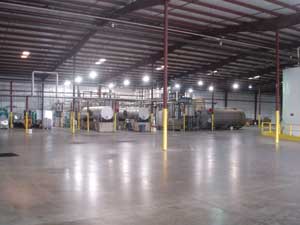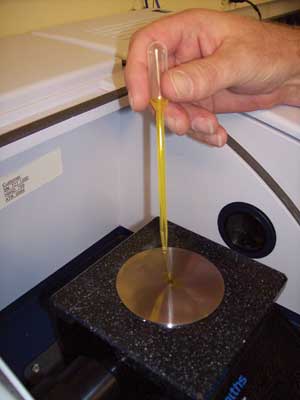Quality Testing at Light Speed




January 17, 2008
BY Barbara Stefl
From a casual discussion with a county development agent in 2004 to full production in August 2006, much can be learned from Charles Whittington's practical approach to starting and running a successful biodiesel production facility.
Whittington, known to his friends as Shorty, is a local entrepreneur and owner of Grammer Industries Inc., a common-carrier trucking company specializing in the transportation of fertilizers in the Midwest. As a board member and chairman of the Indiana Motor Truck Association, chairman of the Agricultural Transporters Conference and vice chairman of the American Trucking Association, he was well positioned to understand both the need and the potential of an alternative fuel such as biodiesel.
Once Whittington became inspired to start a biodiesel operation, all that was needed was to learn as much as possible, as fast as possible.
The Quest Began
The small team that Whittington assembled to build a biodiesel company was long on smarts but short on biodiesel industry experience. John Whittington, Charles' son, had a degree in agricultural business management and had been working in the family business for many years. Charles also hired Ron Howe, a contract historian and researcher, who brought a pragmatic approach to gathering the facts needed to make sound decisions on building and running a biodiesel facility.
They had the site, an empty lumber warehouse in Morristown, Ind.-30 miles east of Indianapolis-and now they needed to find the equipment.
One of the first orders of business was to join the National Biodiesel Board and to attend the National Biodiesel Conference & Expo in early 2005. It was there that the team first started talking to design/build firms to build a plant for what was to become Integrity BioFuels. It was in these early meetings and business trips Charles' team began to see building lead times of more than 18 months due the increasing popularity of biodiesel. Understandably, they wanted to move faster.
Shortening the Build Cycle
In order to find a faster building approach, Whittington's team switched their search to component manufacturers in hopes it would decrease the construction lead time. This approach had the added benefit of allowing them to see the biodiesel being manufactured by the actual components that they intended to purchase.
"In one of our trips visiting component manufacturers, we shipped a full trailer of the soy oil beforehand to see the biodiesel actually manufactured at their facility," says Howe, Integrity BioFuels' quality management representative. "While we learned a lot on that trip, the key learning came when we had to wait two weeks for the test results of their test runs that took 15 minutes to make. It didn't take us long to see that that was terribly inefficient. If we wanted our plant built and calibrated on time and then keep it calibrated going forward, we had to find an easier and faster testing method."
Finding Fast Quality Control
While researching the Internet to better define the quality control requirements of the new facility, Howe discovered a trademarked quality and process control approach called the QTA System developed by the Cognis Corp. The QTA System overcame the need to build a testing lab, hire chemists or wait for extended periods for testing results. At the plant end of the QTA System is a mid infrared instrument-a standard piece of equipment used for years in food and agrochemical control industries-that measures the various quality traits of a single drop of biodiesel. These digitized traits are then sent via the Internet to a central database at Cognis. The data are instantly analyzed by a complex set of chemist-developed calculations that convert the traits into standard quality control measures that can be understood by plant operators.
"The entire quality control process-from taking the sample to reading the results-could be conducted by most plant personnel regardless of their background," Howe says. "Plus, each analysis takes less than two minutes to complete, enabling us to dramatically increase our testing frequency."
Increasing the Learning Curve
While Integrity BioFuels' plant was being designed and built, the start-up team decided to get hands-on experience by also buying a residential biodiesel brewing kit to "practice" making biodiesel. Together with the fast quality feedback loop offered by the QTA System, they started producing small quantities of biodiesel that met and exceeded industry standard quality measures.
This fast-feedback-loop process was repeated during plant start-up-creating small batches, getting quality results in two minutes, recalibrating the plant, creating another small batch-and allowed Integrity BioFuels to move through plant commissioning and get up and running at a much faster pace.
Today, many of Integrity BioFuels' employees participate in the quality and process control process. "The easy-to-use QTA System allows at least two people on every shift to get involved and test the quality of our biodiesel," Howe says. "If you can use a dropper you can analyze a sample."
Howe adds, "Additionally, I can now test our biodiesel much more frequently-more than 700 times a month-to monitor the quality of our production on a more continuous basis to ensure the highest quality products for our customers."
Integrity BioFuels Vice President John Whittington confirmed it this way: "The QTA System has proven to be an extremely valuable tool for our plant start up and operation," he says. "It is the quickest, most cost-efficient method we have found to ensure that every load that leaves our plant falls within specifications. Samples are taken while the truck is loading and results for that specific load leave in the hand of the driver along with the bill of lading."
Barbara Stefl holds master's degrees in chemical engineering and business administration. She is the global business director, QTA at the Cognis Corp. Reach Stefl at barbara.stefl@cognis.com. For more information on Integrity BioFuels, visit www.integritybiofuels.com. For more information on the QTA System, visit www.qta.com.
Whittington, known to his friends as Shorty, is a local entrepreneur and owner of Grammer Industries Inc., a common-carrier trucking company specializing in the transportation of fertilizers in the Midwest. As a board member and chairman of the Indiana Motor Truck Association, chairman of the Agricultural Transporters Conference and vice chairman of the American Trucking Association, he was well positioned to understand both the need and the potential of an alternative fuel such as biodiesel.
Once Whittington became inspired to start a biodiesel operation, all that was needed was to learn as much as possible, as fast as possible.
The Quest Began
The small team that Whittington assembled to build a biodiesel company was long on smarts but short on biodiesel industry experience. John Whittington, Charles' son, had a degree in agricultural business management and had been working in the family business for many years. Charles also hired Ron Howe, a contract historian and researcher, who brought a pragmatic approach to gathering the facts needed to make sound decisions on building and running a biodiesel facility.
They had the site, an empty lumber warehouse in Morristown, Ind.-30 miles east of Indianapolis-and now they needed to find the equipment.
One of the first orders of business was to join the National Biodiesel Board and to attend the National Biodiesel Conference & Expo in early 2005. It was there that the team first started talking to design/build firms to build a plant for what was to become Integrity BioFuels. It was in these early meetings and business trips Charles' team began to see building lead times of more than 18 months due the increasing popularity of biodiesel. Understandably, they wanted to move faster.
Shortening the Build Cycle
In order to find a faster building approach, Whittington's team switched their search to component manufacturers in hopes it would decrease the construction lead time. This approach had the added benefit of allowing them to see the biodiesel being manufactured by the actual components that they intended to purchase.
"In one of our trips visiting component manufacturers, we shipped a full trailer of the soy oil beforehand to see the biodiesel actually manufactured at their facility," says Howe, Integrity BioFuels' quality management representative. "While we learned a lot on that trip, the key learning came when we had to wait two weeks for the test results of their test runs that took 15 minutes to make. It didn't take us long to see that that was terribly inefficient. If we wanted our plant built and calibrated on time and then keep it calibrated going forward, we had to find an easier and faster testing method."
Finding Fast Quality Control
While researching the Internet to better define the quality control requirements of the new facility, Howe discovered a trademarked quality and process control approach called the QTA System developed by the Cognis Corp. The QTA System overcame the need to build a testing lab, hire chemists or wait for extended periods for testing results. At the plant end of the QTA System is a mid infrared instrument-a standard piece of equipment used for years in food and agrochemical control industries-that measures the various quality traits of a single drop of biodiesel. These digitized traits are then sent via the Internet to a central database at Cognis. The data are instantly analyzed by a complex set of chemist-developed calculations that convert the traits into standard quality control measures that can be understood by plant operators.
"The entire quality control process-from taking the sample to reading the results-could be conducted by most plant personnel regardless of their background," Howe says. "Plus, each analysis takes less than two minutes to complete, enabling us to dramatically increase our testing frequency."
Increasing the Learning Curve
While Integrity BioFuels' plant was being designed and built, the start-up team decided to get hands-on experience by also buying a residential biodiesel brewing kit to "practice" making biodiesel. Together with the fast quality feedback loop offered by the QTA System, they started producing small quantities of biodiesel that met and exceeded industry standard quality measures.
This fast-feedback-loop process was repeated during plant start-up-creating small batches, getting quality results in two minutes, recalibrating the plant, creating another small batch-and allowed Integrity BioFuels to move through plant commissioning and get up and running at a much faster pace.
Today, many of Integrity BioFuels' employees participate in the quality and process control process. "The easy-to-use QTA System allows at least two people on every shift to get involved and test the quality of our biodiesel," Howe says. "If you can use a dropper you can analyze a sample."
Howe adds, "Additionally, I can now test our biodiesel much more frequently-more than 700 times a month-to monitor the quality of our production on a more continuous basis to ensure the highest quality products for our customers."
Integrity BioFuels Vice President John Whittington confirmed it this way: "The QTA System has proven to be an extremely valuable tool for our plant start up and operation," he says. "It is the quickest, most cost-efficient method we have found to ensure that every load that leaves our plant falls within specifications. Samples are taken while the truck is loading and results for that specific load leave in the hand of the driver along with the bill of lading."
Barbara Stefl holds master's degrees in chemical engineering and business administration. She is the global business director, QTA at the Cognis Corp. Reach Stefl at barbara.stefl@cognis.com. For more information on Integrity BioFuels, visit www.integritybiofuels.com. For more information on the QTA System, visit www.qta.com.
Advertisement
Advertisement
Upcoming Events





